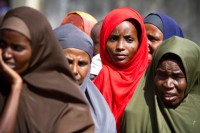
By Carly Fabian
Carly Fabian is a participant in STAND’s Guide to Navigating the Blogosphere. Interested in getting lessons on best practices for blogging and writing on conflict and mass atrocities prevention issues? Join the program! The program is intended to train students to effectively express their own views on international human rights issues; consequently, the views expressed in Blogging Bootcamp posts are those of the participants and do not necessarily reflect official STAND policy stances.
Trigger Warning: this content discusses violent sexual assault.
Last Thursday, the United States recognized the government of Somalia after twenty years of violent anarchy. A new Somali administration took over last year, marking the transition from a temporary government to a government that is supposed to be both stable and permanent. The African Union, allied with government, Ethiopian soldiers, and contracted soldiers, has been slowly taking back land and important towns from the terrorist group, al Shabab, that has ravaged the country in recent years. Hillary Clinton, after speaking to the Somali president, said that this was a “milestone.” But despite the Somali government’s advances, it has failed to appropriately respond to the serious problem of sexual violence against women in it’s war-torn regions. The government cannot command the loyalty and respect of it’s people if it does not fully protect half of its population, particularly from its own military. The state has a responsibility to protect its citizens, particularly those in war zones, from endemic violence. If the new Somali government is to be viewed as the legitimate representative of its people it must fulfill this responsibility.
Years of fighting have left most women as the sole caretakers of their families, leaving them without protection in IDP camps that are often controlled by Shabab militants. Women who venture out, either on a journey to another IDP camp or just to the bathroom, are vulnerable to attack. And the Shabab, lacking money and supplies, have been paying soldiers with “temporary wives,” abducted young girls who are given to the soldiers for several weeks in the place of payment. The girls are often as young as twelve, and if they refuse, they are given two options: death by bullet or death by stoning.
Only days after the US recognized the Somali government, a new rape case involving the government made international headlines. A rape-victim contacted an Al Jazeera reporter and told the reporter that a group of men in government uniforms had gang-raped her. This is not a rare case in the fact that the woman was attacked or in the fact that it was by men affiliated with the government, but rather in the way of the government’s response. Rather than investigating her claim, the government placed a Somali journalist connected with the story in jail, and began a campaign of harassment aimed at the rape victim as well as anyone who was thought to be aiding her.
Sister Somalia, a sexual violence crisis center, is now fearing not only intimidation by the government, but also that this incident will make victims of sexual violence more afraid than ever to come forward. Sister Somalia has worked for years to encourage women, who already harbored rational fears of retribution, rejection, and violence for speaking out, into treatment and rehabilitation. But they fear that their progress might be set back by renewed government intimidation.
The next few months will determine the seriousness of the new American involvement in Somalia. The US should remember that despite Somalia’s advancements, its treatment of women should be a reason why aid cannot be given free of requirements, but instead must be given in return for greater advancement and protection of women and young girls. By ignoring and even attempting to silence the plight of women and young girls within its borders, the new Somali government will lose legitimacy both internationally and internally. While US recognition offers great financial assistance to the governments and economies of struggling countries, the US should also use its leverage as a major donor nation to ensure that the new Somali government fulfills its obligation to control its armed forces and protect IDP camp residents from harm.
